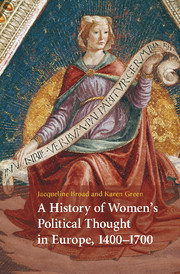Book contents
- Frontmatter
- Contents
- Preface
- Introduction
- 1 Christine de Pizan
- 2 Women of the Italian Renaissance
- 3 From Anne de Beaujeu to Marguerite de Navarre
- 4 Queen Elizabeth I of England
- 5 From the Reformation to Marie le Jars de Gournay
- 6 Women of the English civil war era
- 7 Quaker women
- 8 The Fronde and Madeleine de Scudéry
- 9 Margaret Cavendish, Duchess of Newcastle
- 10 Women of the Glorious Revolution
- 11 Women of late seventeenth-century France
- 12 Mary Astell
- Conclusion
- Bibliography
- Index
3 - From Anne de Beaujeu to Marguerite de Navarre
Published online by Cambridge University Press: 02 July 2009
- Frontmatter
- Contents
- Preface
- Introduction
- 1 Christine de Pizan
- 2 Women of the Italian Renaissance
- 3 From Anne de Beaujeu to Marguerite de Navarre
- 4 Queen Elizabeth I of England
- 5 From the Reformation to Marie le Jars de Gournay
- 6 Women of the English civil war era
- 7 Quaker women
- 8 The Fronde and Madeleine de Scudéry
- 9 Margaret Cavendish, Duchess of Newcastle
- 10 Women of the Glorious Revolution
- 11 Women of late seventeenth-century France
- 12 Mary Astell
- Conclusion
- Bibliography
- Index
Summary
The debate that took place from the fifteenth to the seventeenth century about the relative worth and capacities of men and women has come to be known as the querelle des femmes. This phrase can evoke images of querulous, quarrelsome women. Some dismiss the debate as nothing but an academic dispute among scholars, of no social relevance. According to Simone de Beauvoir, it ‘was a secondary phenomenon reflecting social attitudes but not changing them’. Yet, for all the polemical and satirical aspects of some of this literature, the fifteenth century saw the consolidation of a set of arguments and strategies, initially collected by Christine in The Book of the City of Ladies, which together refuted the Aristotelian view that women lacked prudence and were incapable of governing. Once noblewomen's fitness to rule as prudent monarchs was established, at least in the minds of educated women, it was a small step to conclude that women in general had a perfectly sound capacity for self-determination, and thus women's subjection to their husbands was ultimately open to question. The evolution of such arguments would be spread over the next three centuries, and would sometimes take surprising turns. The first sixteenth-century woman whose thought we shall look at in detail, Marguerite de Navarre (1492–1549), was a defender rather than a critic of marriage, though she demonstrated in her actions women's capacity as prudent governors of their realms.
- Type
- Chapter
- Information
- Publisher: Cambridge University PressPrint publication year: 2009

